
Secondments
As a Graphene NOWNANO CDT student, you will have the opportunity to take a funded placement in a range of industry and academic organisations.
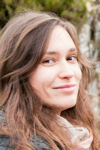
I was happy to use this opportunity to go to a different country, get a change of environment, and obtain not only interesting results, but also an idea how it feels to work in different labs.
Vaiva Nagyte / CDT graduate based in the Department of Chemistry
We're keen to encourage our students to take the skills they have learned and apply them in the real world.
The placements we offer are normally two months long in duration, and take place in the second half of Year 3 (though this is reasonably flexible).
Read what current and past students thought of their placements in the reports below.
Student reports
Graphenea, Spain - Gabriel Casano Carnicer
Gabriel had the following to say about his experience:
"The placement lasted for eight weeks and it allowed me to get acquainted with and contribute to their R&D efforts.
"Graphenea is a young company which manufactures and distributes graphene and related materials for both academic and industrial clients.
"As part of the Graphene Oxide division, I worked in the R&D section, producing research samples for testing. I learnt about how new materials and techniques get evaluated when beginning to be considered for future commercialisation.
"I was able to learn about the processes that go into making the products that are currently commercialised.
"Overall, I am very happy with the experience. I gained not only new technical skills and knowledge but also a better understanding of what research in a commercial setting is like.
"I was also able to develop my soft skills, working as part of a small group which provided continuous feedback and encouragement."
Karlsruhe Institute of Technology, Germany - Steffan Llewellyn
Steffan had the following to say about his experience:
"I was able to work with the Dip-Pen Nanolithography group at the Karlsruhe Institute of Technology for three months. The group applies lithography techniques for biomedical applications, which is why I was interested in applying.
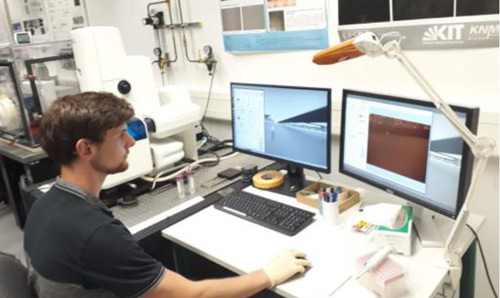
"My secondment involved using a microchannel cantilever to deposit proteins onto graphene oxide derived surfaces, and evaluating whether the protein of interest remained stable under conditions for cell-culture.
"I was able to use a new instrument independently, which is of great interest in the biotechnology industry for developing sensing devices, and improve on my previous knowledge on the material I was using.
"I had the opportunity to attend networking events, gaining a valuable insight into how research groups and start-ups communicate their work as well as their expertise with the industry.
"I thoroughly enjoyed my secondment and I'm glad I had the opportunity to take part in research within a different environment.
"With my spare time, I was able to travel around the German state of Baden-Württemberg, including seeing sights like Heidelberg and Hohenzollern Castle."
Karlsruhe Institute of Technology, Germany - Vaiva Nagyte
Vaiva had the following to say about her experience:
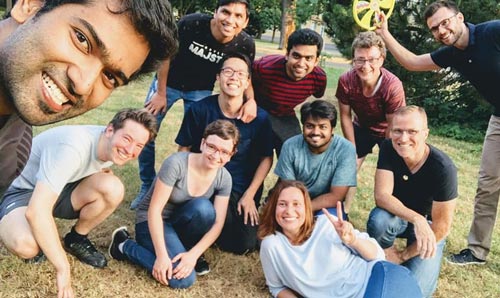
"I was fortunate to get an opportunity to go for 2 months secondment in Germany at the Karlsruhe Institute of Technology (KIT) in Professor Ralph Krupke’s group. KIT was established quite recently (in 2009) after the merging of Karlsruhe Research Centre and the University of Karlsruhe. Due to a national nuclear research purpose of Karlsruhe Research Centre, the north campus where I worked was quite remote. However, I really enjoyed cycling those 12 km through the woods every summer morning and probably this kept me fit after eating all those potato salads and schnitzels. Also, having a newly built institute, the working conditions were superb.
"The idea of this secondment was to implement the dielectrophoresis technique for electrochemically exfoliated graphene (ECE): depositing individual flakes between contacts and obtaining the individual ECE graphene flake’s conductivity as well as the representative Raman spectrum. This led to the better understanding of the physical properties of ECE graphene and how they are influenced by trans-polyacetylene (t-PA) chain formation. In addition, this allowed me to gain experience in device fabrication and electrical characterisation.
"Even though the secondment project was based on my PhD research, it gave me a valuable different perspective to the challenges I faced and helped me to get a better understanding about the material I am working with. It was intriguing not only for me, but also for Krupke’s group, as no one had done this before in their group. This symbiosis resulted in thought-provoking challenges that were tackled together and we all learned a bit of something new.
"I was happy to use this opportunity to go to a different country, get a change of environment, and obtain not only interesting results, but also an idea how it feels to work in different labs. Meeting other researchers and academics also expanded my network which could be useful in the future."
National University of Singapore - Matt Holwill
Former student Matthew Holwill completed a two-month placement at the National University of Singapore, funded by Graphene NOWNANO.
He worked under the supervision of Professor Lu Jiong in the Department of Chemistry and spent some time at the Centre for Alternative 2D materials showing researchers some techniques and fixing devices.
He summed up his experiences as: "Working in a different group of researchers who have a vastly different perspective and level of expertise has helped me develop my understanding to an extent that would not have been possible here in Manchester. I got to see the city and experience a completely different way of life...also, the food is incredible!"
Ohio State University, United States - Pietro Steiner
Pietro had the following to say about his experience:
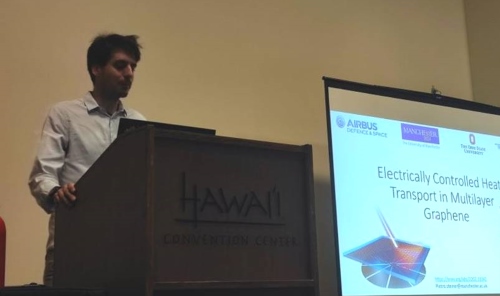
“It was such a great experience to travel to the USA for my secondment at the Ohio State University. I had the great opportunity to learn a new thermal characterisation technique and expand my scientific and personal knowledge.
While I was in the USA, I attended the MRS spring conference in Honolulu, where I had the opportunity to present my recent work. It was exciting to finally participate in person at the conference and network with scientists from all over the world! I am so thankful to the CDT for sponsoring this AWESOME experience and highly recommend making good use of this great opportunity.”
Springer Nature, Germany - Seb Leaper
Former student Seb Leaper completed his month-long secondment working for Dr Amir Gheisi at Springer Nature in Heidelberg, Germany. Reflecting on his experience, he said:
"My time in Heidelberg provided me with an insight into the world of academic publishing and was thoroughly enjoyable and educational.
"I worked alongside some excellent people with a variety of scientific backgrounds from whom I learned a lot.
"I also managed to travel around Germany a bit, going to Stuttgart's Mercedes Benz museum, as well as spending a weekend in Berlin where I had the best Glühwein of my life."
Technical University of Denmark - Thomas Lane
Thomas had the following to say about his secondment experience:
"I was a guest researcher at the Technical University of Denmark within the group of Professor Antti-Pekka Jauho.
"Like my own group in the National Graphene Institute this group develops theoretical models of 2D systems, but with a far stronger focus on numerical techniques that I have not had the opportunity to use thus far.
"During this secondment I learned how to implement tight-binding calculations for investigating electronic transport properties in lattice structures with broken in-plane periodicity.
"Using this type of technique we can probe properties such as conductance and local density of states across domain boundaries in 2D materials, as well as investigate the energy dispersion of electrons localised at the device interfaces and edges.
"The secondment was a great way to experience working in a different institution with a range of students and supervisors, share the results of my previous studies, and develop a skill in a key area of theoretical physics that I had not touched before."
Thales, France - Harry Waring
Harry had the following to say about his experience:
"I undertook a secondment at Thales Research and Technology (TRT) in Palaiseau near Paris for two months. This was, for me, an ideal placement as Thales has a long-standing interest in developing nanoscale magnetic materials for a range of novel technological applications, and I was particularly keen to experience the ways an industrial research lab operated in an area related to my PhD studies."
"The focus of the secondment involved the study and application of the nascent field of spin waves (magnonics), an emerging area in magnetic research. This subject area is widely tipped to have a revolutionary impact on areas of technology such as information transmission and computer memories. Due to the modelling aspects of this work, I am now proficient at carrying out simulations of magnetic systems where I have previously collected experimental data. I also gained experience with extra analysis software I have not had the opportunity to use before, greatly enhancing my scientific skillset."
"By visiting and being part of a lab in a different country, I feel that I have grown in confidence and have gained valuable soft skills in terms of collaborating and working in a wider range of environments. In particular, the chance to network and build contacts has been invaluable and will be extremely beneficial in terms of a future career in either academia or industry. I also made the most of the opportunity to explore Paris, visiting sights like the Eiffel Tower and Palace of Versailles.”
University of Zaragoza, Spain - Clara Skuse
Clara had the following to say about her experience:
With the help of the NOWNANO CDT, I was lucky enough to do a research placement at the Instituto de Nanociencia y Materiales de Aragón at the University of Zaragoza for 3 months this spring.
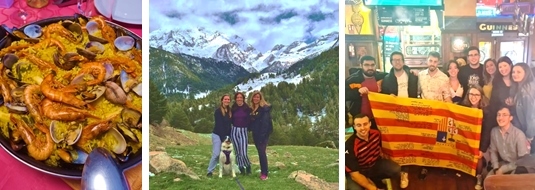
The placement aim was to incorporate metal organic frameworks (MOFs), which I had no previous experience with, into GO membranes for desalination. I particularly enjoyed learning about a completely new material and experiencing the different unwritten rules in academia, from a European perspective! The facilities at the University of Zaragoza were incredibly impressive and I have come away with methods to improve my experimental set-up back in Manchester.
The weekends were full of wine-tasting trips to vineyards in Cariñena, hiking in the Pyrenees and sobremesa on Sundays after a massive plate of paella. The organising process was easy and I could not recommend it more to younger years. At minimum, a placement is an amazing way to break up your normal routine; it is extremely motivating and conducive to writing the thesis. At best, it is an incredible experience where you will be able to call another city your home!
Thank you to my supervisor Dr Patricia Gorgojo, my mentor Dr Jose Miguel Luque Alled, and the CDT for all their help!
